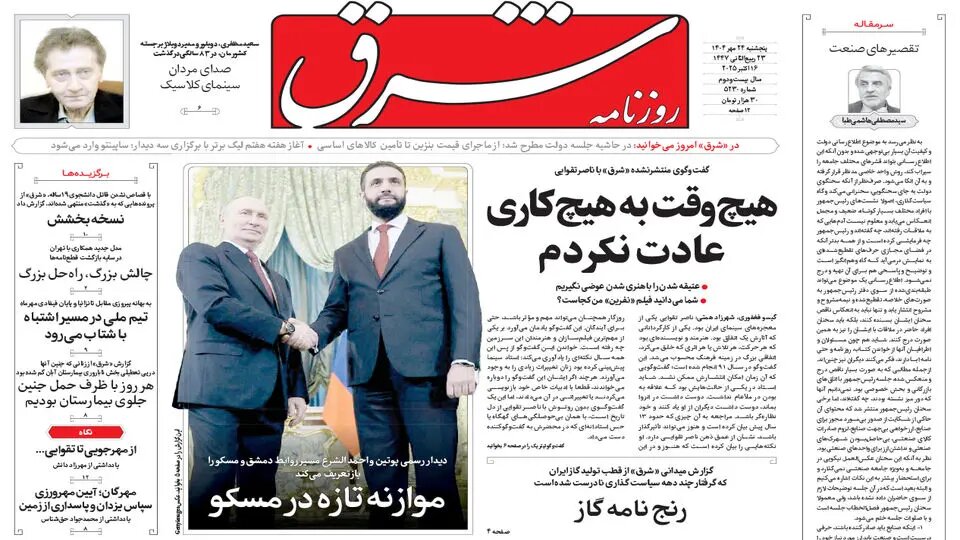IAEA is on a political path

TEHRAN - Shargh examined the developments related to Iran’s nuclear engagement until the next meeting of the International Atomic Energy Agency (IAEA) Board of Governors.
The newspaper says: The experience of the past years has shown that the IAEA’s performance towards Iran has mostly been influenced by the political motivations of Western major countries, rather than technical and professional issues. Now, in the so-called “post-snapback” period, this pattern is expected to continue, with the difference that the IAEA is assessing costs and benefits instead of taking a decisive or overt political stance in the current circumstances. Grossi is trying to maintain a balance between political pressure and the need to maintain the technical credibility of the Agency. Recognizing prevalence of politics over professionalism in the IAEA, Tehran is trying to use technical engagement as a pressure management tool at the appropriate time and to prevent itself from getting caught up in a new cycle of sanctions. Overall, the current trend shows that both Iran and the Agency, on the eve of the critical November meeting, are seeking to maintain a fragile balance; a balance between controlled cooperation and preventing a return to a confrontational atmosphere.
Javan: Trump unintentionally acknowledges Iran's power
Javan wrote in a commentary on Trump's statements during his trip to Sharm el-Sheikh, Egypt: Trump, in his speeches, both during his trip to the occupied territories and at the Sharm el-Sheikh summit, has tried to present Iran as a threat to regional countries by making irresponsible and shameful claims against the Iranian nation and defending America's brutal crimes in assassinating General Soleimani and attacking Iran in the 12-day war in June. However, his request for negotiations, is an acknowledgement of Iran's power and failure of America's strategy to contain Iran's influence and deterrence. What is important is that Iran's response to America and the Zionist regime in the 12-day war and the infliction of blows on these two regimes, along with maintaining and strengthening its preparedness in the post-war period, have strengthened and stabilized the position of the Islamic republic in the world. This is why the leaders of the European troika, under American order and pressure, have targeted the country's economic and social peace and stability by implementing "snapbacks" sanctions and are waiting for the defeat of national unity and cohesion of the Iranian people so that, in their opinion, they can pave the way for the Iranian people to surrender.
Farhikhtegan: Iran’s refusal to attend Sharm el-Sheikh shows its authority
Farhikhtegan discussed Iran’s refusal to attend the Sharm el-Sheikh summit on Trump’s 20-point plan for Gaza in an interview with Seyyed Abbas Mousavi, a foreign policy expert. He says: This absence not only did not lead to isolation, but also helped preserve Iran’s authority. The absence from such meetings, which are intended to praise a global dictator (Donald Trump) or to gain approval from other countries for a person whose wishes and desires are known to everyone, is, incidentally, the same as power and authority and a symbol of independence. Where there is an opportunity, where the honor and dignity of the Iranian nation is preserved, the Islamic Republic of Iran will definitely make a decision immediately and participate in these various meetings. As we have witnessed, the Islamic Republic of Iran has participated in many important international meetings, announced its position authoritatively. However, the absence from a meeting that was planned and is for specific purposes, and the approval of a specific individual and a specific movement in the world, not only will not cause isolation, but it will definitely be praised and respected by the independent governments and nations of the world.
Arman-e-Melli: Israel looking for new conspiracies
Amir Hayat Moghadam, a member of the National Security and Foreign Policy Committee of the Parliament, tells Arman-e-Melli: The Zionist regime did not achieve everything it intended in its 12-day attack, so it is now looking for new conspiracies including terror, economic pressures, and street riots. The Islamic Republic of Iran not only is not looking for tension or conflict, but has always tried to establish collective security in the Persian Gulf and West Asia. We believe that the security of this region should be ensured by the countries of the region, not by extra-regional countries that only think about their own interests. The presence of foreigners has never brought and will never bring security. Instead, it has created insecurity, arms race, and artificial crises. Today, the Islamic Republic of Iran, relying on its deterrent power and within the framework of political rationality, will not allow enemies under any circumstances to undermine the country's national interests.
Leave a Comment